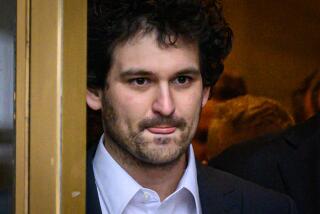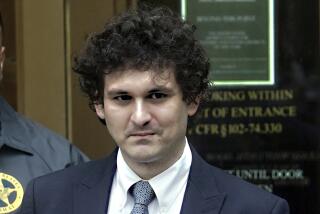Quattrone Makes His Case to Jury
- Share via
NEW YORK — Almost two weeks into his criminal obstruction-of-justice trial, Frank Quattrone was on the witness stand for barely a minute Thursday when his lawyer asked the question that rests at the heart of the government’s case.
Was Quattrone trying to frustrate probes by a grand jury and federal regulators when he sent a two-line e-mail in December 2000 advising his subordinates to destroy documents that might be of interest to investigators?
“No,” Quattrone insisted to the packed courtroom.
The former Silicon Valley investment banking star, seeking to blunt days of damaging testimony by prosecution witnesses, smiled frequently at the jury and worked to appear at ease as he tried to explain why he sent the now-infamous e-mail.
The government alleges that Quattrone, 47, sent the electronic message to impede investigations by the Securities and Exchange Commission and a federal grand jury into how his former firm, Credit Suisse First Boston, allocated shares of initial public stock offerings to clients.
Quattrone testified that he believed he was following company policy by encouraging employees to discard certain documents. He declared repeatedly that he thought the probes were narrow in scope, were focused on only two IPOs and were aimed at other departments within CSFB.
Coming on the eighth day of the trial, Quattrone’s long-awaited testimony -- which began before lunch, lasted through the afternoon and will resume this morning -- is the centerpiece of the proceeding. The most important exchange may come today or Monday when government attorney Steven Peikin cross-examines Quattrone.
Spectators, about evenly split between government lawyers and Quattrone supporters, crowded into the courtroom and stood in the back as word spread in the courthouse that he had taken the stand. The once-powerful financier initially appeared nervous as he spoke in a low voice but seemed to gain confidence as the day went on.
During his more than three hours on the stand, Quattrone, carefully led by his attorney, John Keker, presented himself as an affable regular guy. The man who once earned more than $120 million in a year described his father as a “pants presser” and a union representative.
Quattrone made a point of being solicitous toward the jury, frequently turning to the jury to deliver his answers, locking eyes with one juror after another. The panelists occasionally leaned forward as Quattrone testified.
Throughout his testimony, Quattrone stressed one of the defense’s central themes: that the former investment banker didn’t think he was interfering with the government inquiries because he believed the probes focused on how CSFB handed out IPO shares to investors.
He stressed that IPO allocations were handled by other units of the investment bank and not by his technology banking team, which put the deals together.
“Did you have any responsibility for any decisions about IPO allocations?” Keker asked, one of many similarly worded questions. Time and again, the witness said he did not.
The government’s case revolves around the brief e-mail Quattrone wrote Dec. 5, 2000, in which he encouraged his staff to comply with an e-mail sent a day earlier by Richard Char, a senior investment banker working for Quattrone.
Char’s e-mail told Quattrone’s technology banking group to follow CSFB’s so-called document retention policy, which called for the destruction of certain documents to prevent investor attorneys from gaining access to them during lawsuits.
Displaying a large chart to make its point, the defense tried to show that Quattrone’s e-mail was one of more than 200 electronic messages that he sent or received that day, implying that Quattrone gave it little thought. Quattrone also testified that he often sent “seconding” e-mails in which he would endorse an instruction handed out by one of his underlings.
Quattrone’s goal in part was to offset damaging testimony that came Oct. 3, when a former CSFB lawyer said he told Quattrone that the financier could become involved in the grand jury probe only hours before he sent his e-mail. Prosecutors also revealed that Quattrone earned about $160 million in a two-year period at the end of the 1990s bull market.
Earlier in the day, a pair of character witnesses testified on Quattrone’s behalf, a friend from his days growing up in south Philadelphia and a business school classmate with whom he later did financial deals.
Quattrone’s childhood friend, Rosario Lamberto, depicted Quattrone as someone who did not forget his friends despite becoming one of the world’s most influential investment bankers.
Quattrone faces up to 25 years in prison if convicted on all counts, although he probably would be sentenced to considerably less under federal guidelines.
More to Read
Get the L.A. Times Politics newsletter
Deeply reported insights into legislation, politics and policy from Sacramento, Washington and beyond. In your inbox twice per week.
You may occasionally receive promotional content from the Los Angeles Times.










